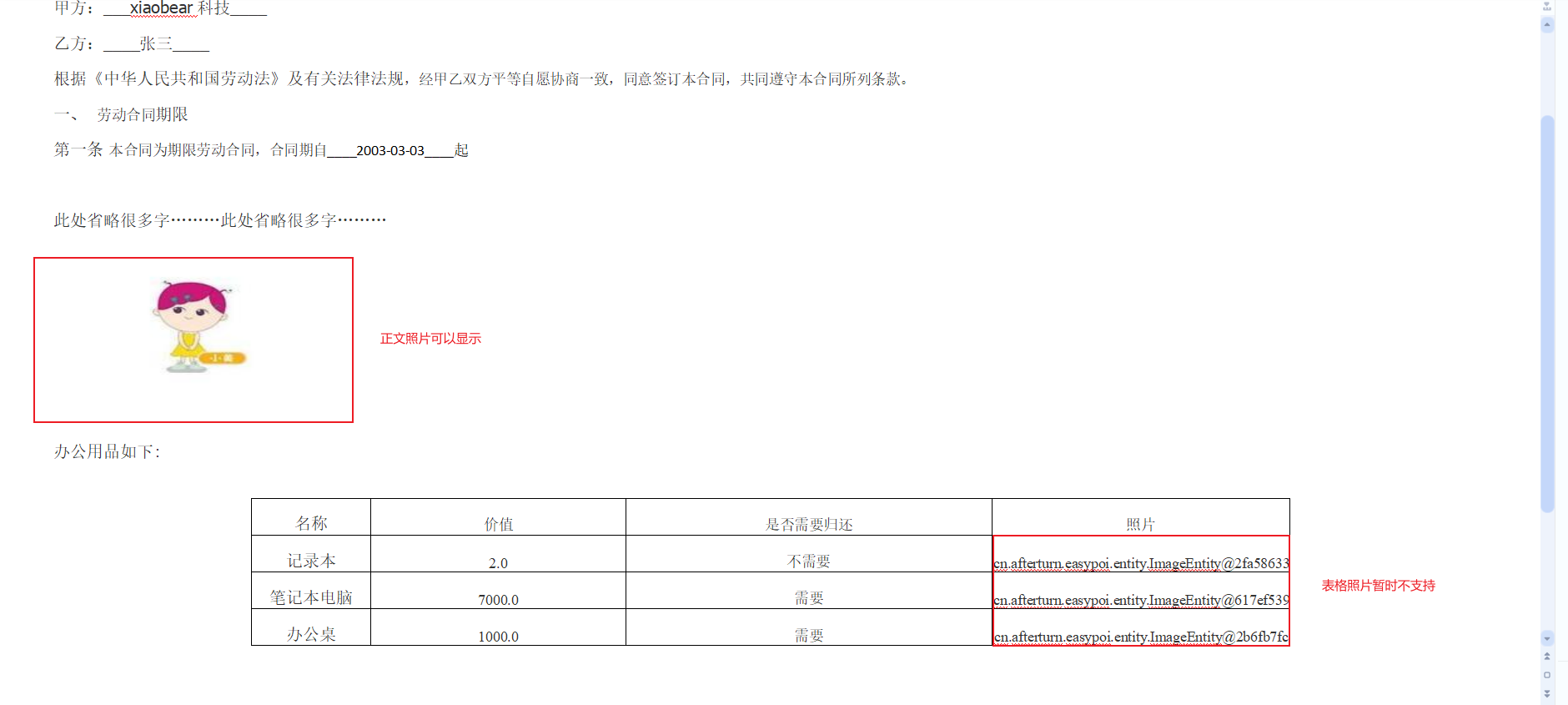6、EasyPOI
1、简介
原文档地址:https://easypoi.mydoc.io/ (比较推荐)
easypoi功能如同名字easy,主打的功能就是容易,让一个没见接触过poi的人员 就可以方便的写出Excel导出,Excel模板导出,Excel导入,Word模板导出,通过简单的注解和模板 语言(熟悉的表达式语法),完成以前复杂的写法
Easypoi的目标是什么
Easypoi的目标不是替代poi,而是让一个不懂导入导出的快速使用poi完成Excel和word的各种操作,而不是看很多api才可以完成这样工作
独特的功能
- 基于注解的导入导出,修改注解就可以修改Excel
- 支持常用的样式自定义
- 基于map可以灵活定义的表头字段
- 支持一堆多的导出,导入
- 支持模板的导出,一些常见的标签,自定义标签
- 支持HTML/Excel转换,如果模板还不能满足用户的变态需求,请用这个功能
- 支持word的导出,支持图片,Excel
需要的依赖
把项目中的poi的依赖去除
<dependency>
<groupId>cn.afterturn</groupId>
<artifactId>easypoi-base</artifactId>
<version>4.1.0</version>
</dependency>
<dependency>
<groupId>cn.afterturn</groupId>
<artifactId>easypoi-web</artifactId>
<version>4.1.0</version>
</dependency>
<dependency>
<groupId>cn.afterturn</groupId>
<artifactId>easypoi-annotation</artifactId>
<version>4.1.0</version>
</dependency>SpringBoot版本
<dependency>
<groupId>cn.afterturn</groupId>
<artifactId>easypoi-spring-boot-starter</artifactId>
<version>4.1.0</version>
</dependency>2、Excel操作
1、导出
注解方式导出
修改实体类,添加注解,用到的是
@Excel注解,使用如下,必须要有空构造函数,否则会报“对象创建错误”| 属性 | 类型 | 类型 | 说明 |
| -------------- | -------- | ---------------- | ------------------------------------------------------------ |
| name | String | null | 列名 |
| needMerge | boolean | fasle | 纵向合并单元格 |
| orderNum | String | "0" | 列的排序,支持name_id |
| replace | String[] | {} | 值得替换 导出是{a_id,b_id} 导入反过来 |
| savePath | String | "upload" | 导入文件保存路径 |
| type | int | 1 | 导出类型 1 是文本 2 是图片,3 是函数,10 是数字 默认是文本 |
| width | double | 10 | 列宽 |
| height | double | 10 | 列高,后期打算统一使用@ExcelTarget的height,这个会被废弃,注意 |
| isStatistics | boolean | fasle | 自动统计数据,在追加一行统计,把所有数据都和输出这个处理会吞没异常,请注意这一点 |
| isHyperlink | boolean | false | 超链接,如果是需要实现接口返回对象 |
| isImportField | boolean | true | 校验字段,看看这个字段是不是导入的Excel中有,如果没有说明是错误的Excel,读取失败,支持name_id |
| exportFormat | String | "" | 导出的时间格式,以这个是否为空来判断是否需要格式化日期 |
| importFormat | String | "" | 导入的时间格式,以这个是否为空来判断是否需要格式化日期 |
| format | String | "" | 时间格式,相当于同时设置了exportFormat 和 importFormat |
| databaseFormat | String | "yyyyMMddHHmmss" | 导出时间设置,如果字段是Date类型则不需要设置 数据库如果是string类型,这个需要设置这个数据库格式,用以转换时间格式输出 |
| numFormat | String | "" | 数字格式化,参数是Pattern,使用的对象是DecimalFormat |
| imageType | int | 1 | 导出类型 1 从file读取 2 是从数据库中读取 默认是文件 同样导入也是一样的 |
| suffix | String | "" | 文字后缀,如% 90 变成90% |
| isWrap | boolean | true | 是否换行 即支持\n |
| mergeRely | int[] | {} | 合并单元格依赖关系,比如第二列合并是基于第一列 则{1}就可以了 |
| mergeVertical | boolean | fasle | 纵向合并内容相同的单元格 |@Data @Table(name="tb_user") public class User { @Id @KeySql(useGeneratedKeys = true) @Excel(name = "编号",orderNum = "0",width = 5) private Long id; //主键 @Excel(name = "姓名",orderNum = "1",width = 10) private String userName; //员工名 @Excel(name = "手机号",orderNum = "2",width = 15) private String phone; //手机号 @Excel(name = "省份名",orderNum = "3",width = 15) private String province; //省份名 @Excel(name = "城市名",orderNum = "4",width = 15) private String city; //城市名 @Excel(name = "工资",orderNum = "5",width = 5) private Integer salary; // 工资 @JsonFormat(pattern="yyyy-MM-dd") @Excel(name = "入职日期",format = "yyyy-MM-dd",orderNum = "6",width = 15) private Date hireDate; // 入职日期 private String deptId; //部门id @Excel(name = "出生日期",format = "yyyy-MM-dd",orderNum = "7",width = 15) private Date birthday; //出生日期 @Excel(name = "一寸照片",orderNum = "8",width = 15, type = 2) private String photo; //一寸照片 @Excel(name = "现在居住地址",orderNum = "9",width = 15) private String address; //现在居住地址 private List<Resource> resourceList; //办公用品 }实现方法
/** * easypoi导出excel * @param response * @throws Exception */ public void exportExcelByEasyPOI(HttpServletResponse response) throws Exception { //设置标题以及sheetName,excel导出类型 ExportParams params = new ExportParams("员工信息","员工数据", ExcelType.XSSF); //获取数据源 List<User> users = userMapper.selectAll(); org.apache.poi.ss.usermodel.Workbook workbook = ExcelExportUtil.exportExcel(params, User.class, users); String fileName = "easypoi导出用户数据列表.xlsx"; response.setHeader("Content-Disposition","attachment;filename="+new String(fileName.getBytes(),"ISO8859-1")); response.setContentType("application/vnd.openxmlformats-officedocument.spreadsheetml.sheet"); workbook.write(response.getOutputStream()); }
2、导入
有导出就应该有导入,我们就把刚才导出的数据库导入到表中
Excel导入时需要的参数类ImportParams常用设置说明
读取指定的sheet 比如要读取上传得第二个sheet 那么需要把startSheetIndex = 1 就可以了
读取几个sheet 比如读取前2个sheet,那么 sheetNum=2 就可以了
读取第二个到第五个sheet 设置 startSheetIndex = 1 然后sheetNum = 4
读取全部的sheet sheetNum 设置大点就可以了
保存Excel 设置 needVerfiy = true,默认保存的路径为upload/excelUpload/Test/yyyyMMddHHmss 保存名称上传时间五位随机数 如果自定义路径 修改下saveUrl 就可以了,同时saveUrl也是图片上传时候的保存的路径
判断一个Excel是不是合法的Excel importFields 设置下值,就是表示表头必须至少包含的字段,如果缺一个就是不合法的excel,不导入
图片的导入
有图片的导出就有图片的导入,导入的配置和导出是一样的,但是需要设置保存路径 1.设置保存路径saveUrl 默认为"upload/excelUpload" 可以手动修改 ImportParams 修改下就可以了
修改实体类,表明哪些需要导入,设置
isImportField = "true"@Data @Table(name="tb_user") public class User { @Id @KeySql(useGeneratedKeys = true) @Excel(name = "编号",orderNum = "0",width = 5, isImportField = "true") private Long id; //主键 @Excel(name = "姓名",orderNum = "1",width = 10, isImportField = "true") private String userName; //员工名 @Excel(name = "手机号",orderNum = "2",width = 15, isImportField = "true") private String phone; //手机号 @Excel(name = "省份名",orderNum = "3",width = 15, isImportField = "true") private String province; //省份名 @Excel(name = "城市名",orderNum = "4",width = 15, isImportField = "true") private String city; //城市名 @Excel(name = "工资",orderNum = "5",width = 5, isImportField = "true") private Integer salary; // 工资 @JsonFormat(pattern="yyyy-MM-dd") @Excel(name = "入职日期",format = "yyyy-MM-dd",orderNum = "6",width = 15, isImportField = "true") private Date hireDate; // 入职日期 private String deptId; //部门id @Excel(name = "出生日期",format = "yyyy-MM-dd",orderNum = "7",width = 15, isImportField = "true") private Date birthday; //出生日期 @Excel(name = "一寸照片",orderNum = "8",width = 15, type = 2, isImportField = "true", savePath = "D:\\28611\\idea-workspace\\xiaobear\\xiaobear-report\\xiaobear-report\\src\\main\\resources\\static\\user_photos\\") private String photo; //一寸照片 @Excel(name = "现在居住地址",orderNum = "9",width = 15, isImportField = "true") private String address; //现在居住地址 private List<Resource> resourceList; //办公用品 }代码实现
/** * easypoi导入 * @param file */ public void importUserByEasyPoi(MultipartFile file) throws Exception{ ImportParams importParams = new ImportParams(); //设置有一行标题 importParams.setTitleRows(1); //设置有一行行头 importParams.setHeadRows(1); List<User> users = ExcelImportUtil.importExcel(file.getInputStream(), User.class, importParams); for (User user : users) { user.setId(null); userMapper.insert(user); } }
3、使用模板导出数据
模板是处理复杂Excel的简单方法,复杂的Excel样式,可以用Excel直接编辑,完美的避开了代码编写样式的雷区,同时指令的支持,也提了模板的有效性;采用的写法是代表表达式,然后根据表达式里面的数据取值
关于样式问题:easypoi不会改变excel原有的样式
制作模板
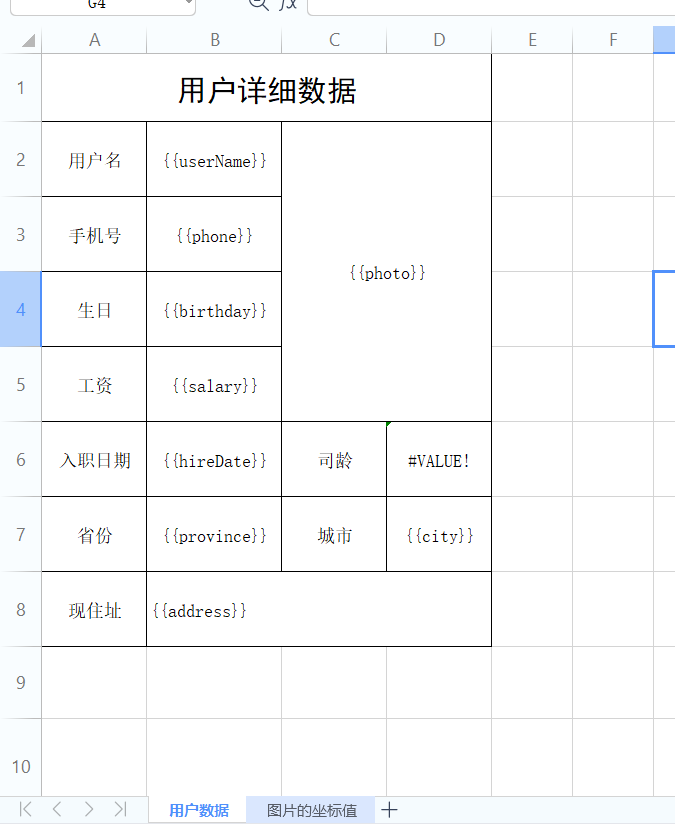
放入项目中
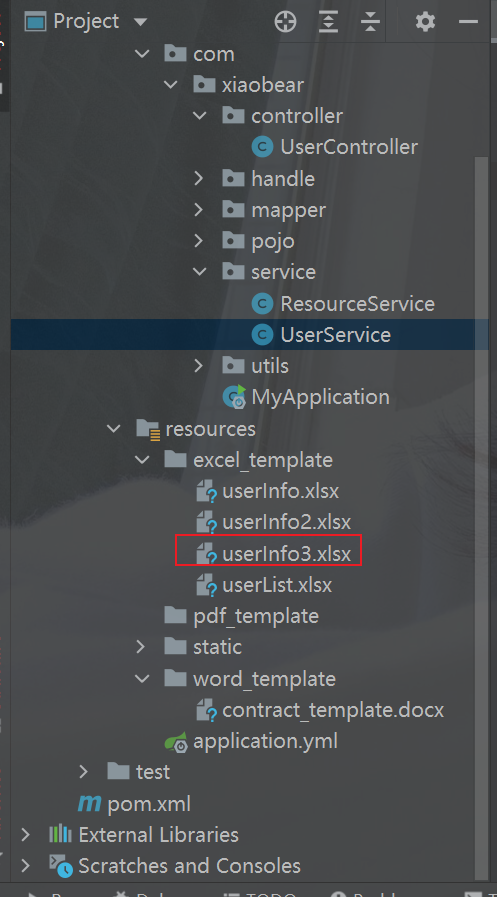
代码实现
/** * 通过easypoi导出word模板 * @param id * @param request * @param response */ public void exportUserInfoWithTemplateByEasyPoi(Long id, HttpServletRequest request, HttpServletResponse response) throws Exception { //获取模板的路径 SpringBoot项目获取根目录的方式 File rootPath = new File(ResourceUtils.getURL("classpath:").getPath()); File templatePath = new File(rootPath.getAbsolutePath(),"/excel_template/userInfo3.xlsx"); //读取模板文件 TemplateExportParams params = new TemplateExportParams(templatePath.getPath(), true); User user = userMapper.selectByPrimaryKey(id); //将对象转成map Map<String, Object> map = EntityUtils.entityToMap(user); //设置图片 ImageEntity imageEntity = new ImageEntity(); /* imageEntity.setWidth(50); imageEntity.setHeight(100);*/ imageEntity.setColspan(2); imageEntity.setRowspan(4); imageEntity.setUrl(user.getPhoto()); map.put("photo",imageEntity); //进行导出 org.apache.poi.ss.usermodel.Workbook workbook = ExcelExportUtil.exportExcel(params, map); //导出的文件名称 String filename="用户详细信息数据.xlsx"; //设置文件的打开方式和mime类型 ServletOutputStream outputStream = response.getOutputStream(); response.setHeader( "Content-Disposition", "attachment;filename=" + new String(filename.getBytes(),"ISO8859-1")); response.setContentType("application/vnd.openxmlformats-officedocument.spreadsheetml.sheet"); workbook.write(outputStream); }
4、导出csv文件
csv的导出基本上和excel的导出一致,大体参数也是一致的
CsvExportParams 的参数描述如下:
| 属性 | 类型 | 默认值 | 功能 |
|---|---|---|---|
| encoding | String | UTF8 | 文件编码 |
| spiltMark | String | , | 分隔符 |
| textMark | String | “ | 字符串识别,可以去掉,需要前后一致 |
| titleRows | int | 0 | 表格头,忽略 |
| headRows | int | 1 | 标题 |
| exclusions | String[] | 0 | 忽略的字段 |
代码:
/**
* easypoi导出csv文件
* @param response
*/
public void downLoadCSVWithEasyPOI(HttpServletResponse response) throws Exception{
ServletOutputStream outputStream = response.getOutputStream();
String fileName = "用户数据.csv";
response.setHeader("Content-Disposition","attachment;filename="+new String(fileName.getBytes(),"ISO8859-1"));
response.setContentType("application/csv");
CsvExportParams csvExportParams = new CsvExportParams();
csvExportParams.setExclusions(new String[]{"照片"});
List<User> users = userMapper.selectAll();
CsvExportUtil.exportCsv(csvExportParams, User.class, users, outputStream);
}3、word操作
导出word
Word模板和Excel模板用法基本一致,支持的标签也是一致的,仅仅支持07版本的word也是只能生成后缀是docx的文档,poi对doc支持不好所以easyPOI中就没有支持doc,我们就拿docx做导出
模板中标签的用法:
| 指令 | 作用 |
|---|---|
| 三元运算 | |
| n: | 表示 这个cell是数值类型 {{n:}} |
| le: | 代表长度{{le:()}} 在if/else 运用{{le:() > 8 ? obj1 : obj2}} |
| fd: | 格式化时间 {{fd:(obj;yyyy-MM-dd)}} |
| fn: | 格式化数字 {{fn:(obj;###.00)}} |
| fe: | 遍历数据,创建row |
| !fe: | 遍历数据不创建row |
| $fe: | 下移插入,把当前行,下面的行全部下移.size()行,然后插入 |
| #fe: | 横向遍历 |
| v_fe: | 横向遍历值 |
| !if: | 删除当前列 {{!if:(test)}} |
| ‘’ | 单引号表示常量值 ‘’ 比如’1’ 那么输出的就是 1 |
| &NULL& | 空格 |
| &INDEX& | 表示循环中的序号,自动添加 |
| ]] | 换行符 多行遍历导出 |
| sum: | 统计数据 |
根据指令,制作模板
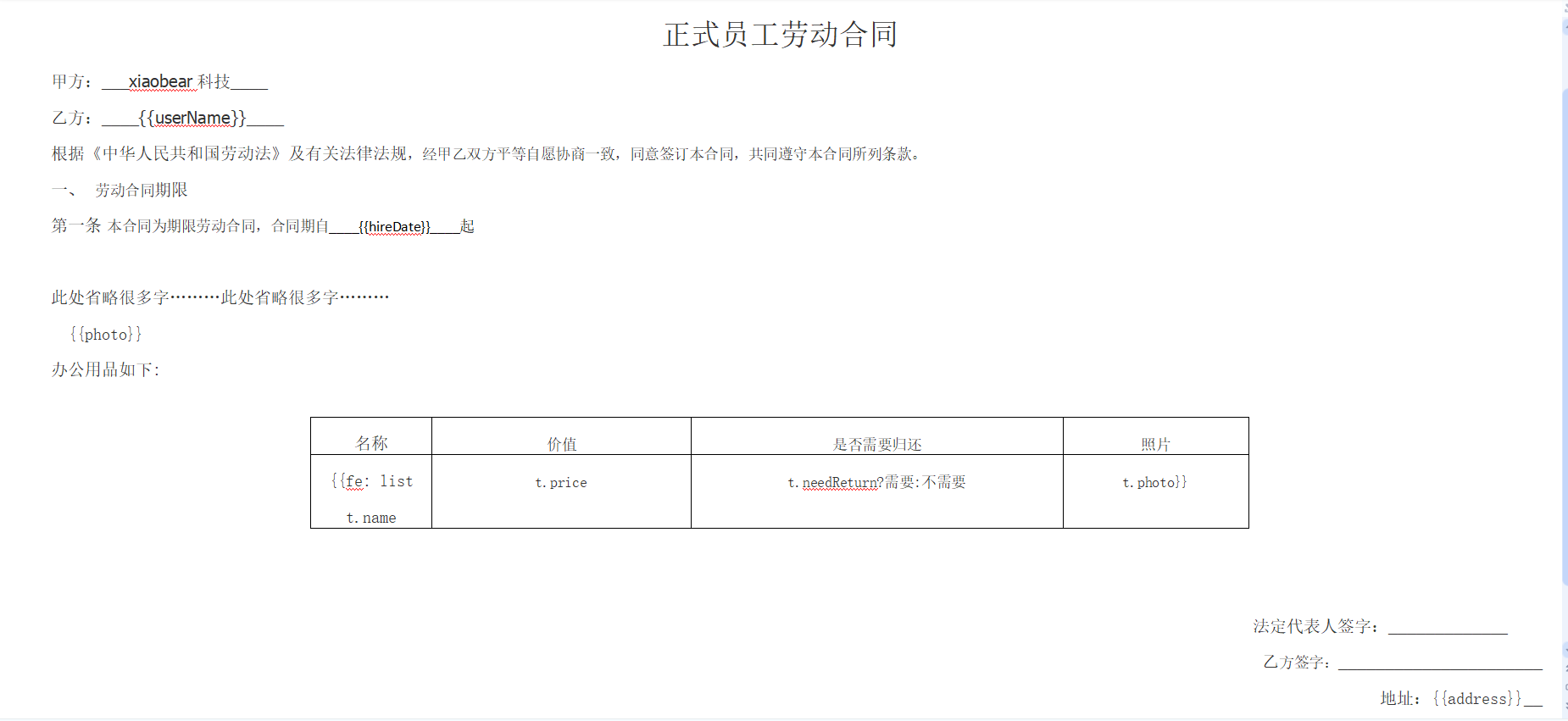
放入项目中
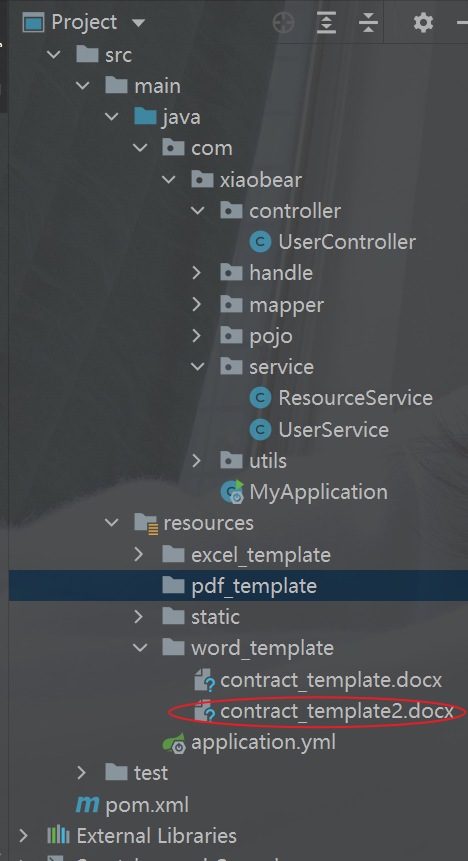
代码实现
/** * easyPOI导出word模板 * @param id * @param response */ public void exportWordByEasyPOI(Long id, HttpServletResponse response) throws Exception{ //获取模板 File root = new File(ResourceUtils.getFile("classpath:").getPath()); File templatePath = new File(root.getAbsolutePath(), "/word_template/contract_template2.docx"); //获取数据 User user = this.findById(id); Map<String,Object> map = new HashMap<>(); map.put("userName",user.getUserName()); map.put("hireDate",sd.format(user.getHireDate())); map.put("address",user.getAddress()); //正文照片 ImageEntity imageEntity1 = new ImageEntity(); imageEntity1.setHeight(180); imageEntity1.setWidth(240); imageEntity1.setUrl(root.getPath()+user.getPhoto()); map.put("photo",imageEntity1); //处理word表格 List<Map> list = new ArrayList<>(); Map<String, Object> map1; for (com.xiaobear.pojo.Resource resource : user.getResourceList()) { map1 = new HashMap<>(); map1.put("name",resource.getName()); map1.put("price",resource.getPrice()); map1.put("needReturn",resource.getNeedReturn()); //表格照片 ImageEntity imageEntity = new ImageEntity(); imageEntity.setHeight(180); imageEntity.setWidth(240); imageEntity.setUrl(root.getPath()+"\\static"+resource.getPhoto()); map1.put("photo",imageEntity); list.add(map1); } map.put("list",list); XWPFDocument document = WordExportUtil.exportWord07(templatePath.getPath(), map); //导出 String filename=user.getUserName()+"_合同.docx"; // 设置文件的打开方式和mime类型 ServletOutputStream outputStream = response.getOutputStream(); response.setHeader( "Content-Disposition", "attachment;filename=" + new String(filename.getBytes(),"ISO8859-1")); response.setContentType("application/vnd.openxmlformats-officedocument.wordprocessingml.document"); document.write(outputStream); }
